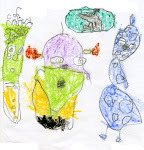I have to admit that I didn't know Max very well, he was seven years younger than me and was in a branch of my extended family that we drifted apart from after the deaths of my uncle and my mom. It's sad that some families drift apart, but I guess it's part of the cycle; kids grow up, have families of their own and start their own life stories when the previous generations have passed on. I don't think I'd seen Max since my wedding almost eight years ago, and then he was an awkward but friendly teenager. I liked him, as I liked his whole family.
I don't intend this post to be a hagiography of a relative I didn't know well enough. It would be unseeming of me to inflate my grief, but it was evident from everything I heard about him that Max was a remarkable young man, and his death a great loss to his loved ones.
No, I intend this post to be about faith and humility, both of which those left behind will have to have in the time to come, both of which I've seen in his family. Max's family, just like every other family--mine and yours--has had their problems, problems which I only know of generally and are not my place to discuss here anyway. But let's just say that they are problems that have broken many people.
But in a sense, they are broken people, as we all are, if we care to admit it. What has always struck me is that all of that part of my family still not only have faith, but it is a faith that has seeped in, internalized, and taken root. Not "professional Catholics," whatever that means, theirs is a faith that recognizes the frailty of one's self and knows the limits of one's strength. But most importantly, recognizes that the true strength to sustain comes from God alone. God alone upholds us in our frailty; God alone is the source of strength; God alone is the source of comfort. All other strength and comfort may come through intermediaries, but their source ultimately is God Who is merciful, God Who loves, God Who shares our sufferings.
Ours is a god who did not suffer cruel death so that we may say, "I'm OK, you're OK." Rather, "I'm not OK. You're not OK. But that's OK." For we are broken people. We are sinful man. We are tempted to cruelty, selfishness, pride and arrogance. But the love of God can transform not only clay into flesh, but hearts of stone into receptacles of burning divine life.
Max was not, I'm sure, a perfect person. But then again, neither am I and neither are you. The point is not whether we are perfect, for by definition that's out of the question. The point is whether we recognize our need for God, and if we recognize that need, whether we seek Him.
Like the parable of the tax collector and the pharisee (Luke 18:9-14), we may either say within our heart that we're Basically Good People (TM) and not in need for God's mercy, so we receive none. Or, we may recognize in His wounds our own guilt and need for mercy, and asking it, receive it.
Grief is a terrible pain at the sense of loss of a loved one. But I believe that grief is a manifestation of God's mercy. Grief makes evident to us the fact that our hearts are made for love, and when a person we have come to love is gone, we recognize that our hearts are missing something that we cannot provide. In grief, we have a need that only someone else can fill. All of us have a need that only someone else can fill, and that recognition is a shadow and a glimmer of the need we have in our hearts that can only be filled by God.
May the angels lead you into paradise;
may the martyrs come to welcome you
and take you to the holy city,
the new and eternal Jerusalem.
May choirs of angels welcome you
and lead you to the bosom of Abraham;
and where Lazarus is poor no longer
may you find eternal rest.
Whoever believes in me, even though that person die, shall live.
I am the resurrection and the life.
Whoever lives and believes in me shall never die.






1 comment:
Great post Honey.
Post a Comment